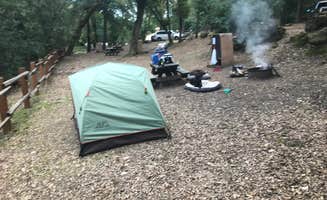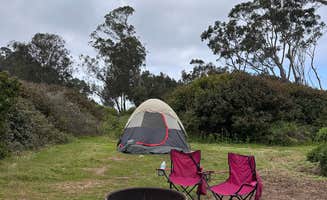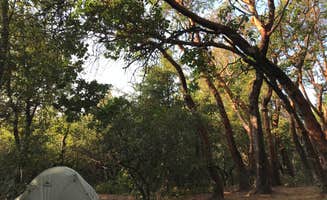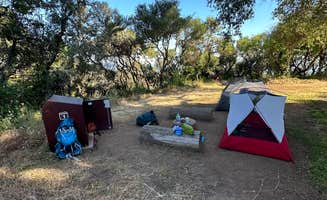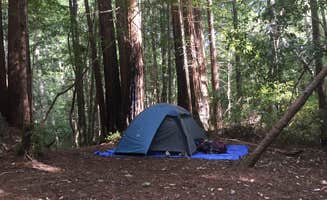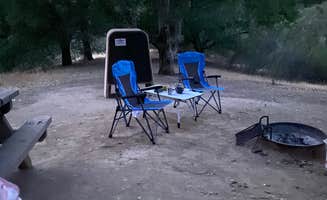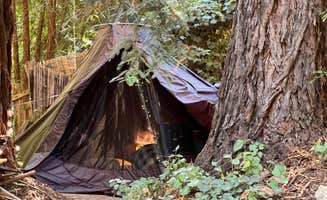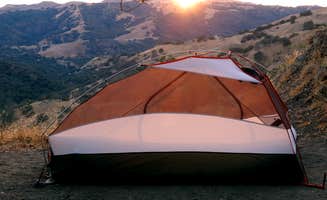Tent camping options near Scotts Valley, California range from primitive backcountry sites to developed campgrounds with amenities. The Santa Cruz Mountains surrounding this area sit at elevations between 600 and 3,000 feet, creating microclimates that can be 10-15 degrees cooler than nearby valley floors. Many campgrounds close seasonal access roads during winter months, with the primary camping season running April through October.
What to do
Waterfall hiking: 6-mile loop at Uvas Canyon County Park with minimal elevation gain suitable for beginners. "Short hikes along the Uvas Creek and Swanson creek are right next to the campground. Trails are narrow and steep at some places but mostly shaded. Small waterfalls are the highlights of the trail, but kids will enjoy playing in the water on hot days," notes Mon M. about Uvas Canyon County Park.
Rock climbing access: 2.5-mile hike to base camp for climbing enthusiasts. "Very green and lots of great vistas along the ridgeline on the hike in," mentions Esther Y. about the trail to Castle Rock Trail Camp, which provides direct access to climbing areas within the state park.
Wildlife viewing: Early morning or dusk opportunities throughout the region. "Lots of beautiful wildlife," reports Ashley E. at Joseph D Grant County Park, where campers frequently spot deer, wild turkeys, and occasionally wild pigs depending on the season.
What campers like
Weather patterns: Moderate coastal influence keeps most sites comfortable year-round. "Great weather, lots of shade at the campsite and on the hikes. Coast was a cool 60's-70's but warm in the sun, night time was a lovely 55-59 degrees, easy to sleep, not too cold," shares Kathleen C. about Ben Ries Campground in nearby Butano State Park.
Fire availability: Seasonal restrictions vary between properties. "As of June 30th, camp fire is still allowed in the pits," noted one visitor at Uvas Canyon, though restrictions change frequently with fire danger levels. Many campgrounds sell firewood on-site to prevent outside wood introduction.
Star visibility: Limited at heavily forested sites. "Hard to find stars as you are canopied in trees but if you walk a little out, the night sky is dark and stars a plenty," explains a camper at Ben Ries Campground. Sites at higher elevations tend to offer better nighttime viewing opportunities.
What you should know
Water sources: Unreliable at primitive sites. "There was no water running at the site when I stayed there, but vault toilets were available," reports Juliana S. about camping at Castle Rock Trail Camp. Bringing your own water supply is essential at most backcountry sites.
Noise factors: Sound carries between sites at more developed campgrounds. "The sites are close together so maybe bring ear plugs in case you have loud neighbors," advises Derek B. about camping at Uvas Canyon. Weekday camping typically offers more solitude than weekends.
Cell service: Limited connectivity throughout region. "Good to be disconnected, but if needed, Verizon cell service worked at the campground," notes one camper at Uvas Canyon. Most campgrounds have no reliable service, with occasional exceptions at higher elevations.
Tips for camping with families
Campsite selection: Request spots away from trails for more privacy with children. "Not every site is able to car camp due to rocks blocking off the parking area but every campsite is pretty nice," explains Athena J. about Manresa State Beach Campground, noting the loading zone was "a short walk to our site."
Bathroom facilities: Variable between properties. "Bathrooms are super clean and showers," reports another camper at Manresa, while more primitive sites like Black Mountain Backpacking Camp offer only pit toilets with no running water.
Insect preparation: Bring repellent for summer months. "A little buggy in the afternoon and found some mosquitoes so take bug spray," advises a visitor to Uvas Canyon. Some sites report seasonal wasp activity, particularly near campsite 25 at Uvas Canyon.
Tips from RVers
Road access: Narrow, winding approaches to most campgrounds. "The road is windy, narrow, and not for the car sick," warns Derek B. about the drive to Uvas Canyon County Park. Many roads leading to campgrounds have tight turns unsuitable for larger RVs.
Parking limitations: Site-specific restrictions affect larger vehicles. "If you plan to sleep in your car, you may want to take leveling blocks as I found the car parking spot to be not leveled at all," suggests Mon M. about Uvas Canyon, one of the few campgrounds accepting small RVs.
Seasonal gate closures: Verify operating hours. "Gate closes 8:15pm," notes Jason R. about Joseph D Grant County Park, highlighting the importance of planning arrival times carefully, especially during shoulder seasons when daylight hours are shorter.


